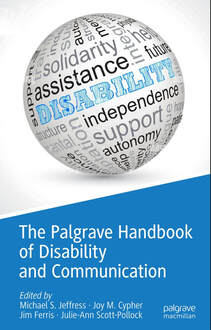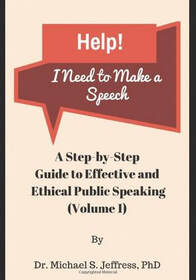"Boasting an amazing collection of authors addressing disability from different perspectives and identities, this Handbook shows the importance of conceiving of disability as a complex set of professional, personal, and political relations -- always meaningful and always more than we expect. Readers are provided many pathways to encounter what disability experience and representation means to communication studies and what communication means to disability studies. The array of chapters constitutes a brilliant way to nurture deeper relations to our embodied selves." -Tanya Titchkosky, PhD, the Ontario Institute for Studies in Education of the University of Toronto, Canada.
“This collection explores, evokes, and enmeshes the overlaps and intersections between disability and communication from a vast and impressive range of perspectives – 27 chapters! Yet the book is so clearly organized, and each chapter so well-written, that the result is both encyclopedic and concise. The Palgrave Handbook of Disability and Communication also could not feel more timely, with every chapter connecting to contemporary issues. This is a tremendous accomplishment, and an incredibly useful resource.“ -Jay Dolmage, Professor of English, University of Waterloo, Founding Editor of the Canadian Journal of Disability Studies.
“This is an exciting collection of essays bringing together disability and communication, but the scope is much larger than the title suggests. Communication is expanded to include the varied uses of language, rhetoric, and media-driven content that is so crucial to our postmodern lives. There is something of great interest in every essay, and the book made me rethink many important ideas in disability studies. It is definitely a must-read book.” -Lennard J. Davis, PhD, Distinguished Professor of Liberal Arts and Science at the University of Illinois at Chicago; Editor of The Disability Studies Reader.
"The communication discipline has incredibly valuable insights to offer on the experience and enactment of disability. The four editors collected and organized The Palgrave Handbook of Disability and Communication, offering tremendous breadth and depth of communication scholarship. The chapter authors span interpersonal, health, mediated, rhetorical, and critical approaches to understanding and living the experience of disability in human life. This volume represents excellence in current scholarship and practices and will be extremely valuable for scholars across academic disciplines, practitioners, and persons experiencing disability." Dawn O. Braithwaite, PhD, Willa Cather Professor of Communication Emerita, University of Nebraska-Lincoln
"The Palgrave Handbook of Communication and Disability expertly explores the intersection of disability and communication and illustrates the cultural power all societies have to transmit communication frameworks that have long stigmatized the experience of disability and its representations. The Handbook deconstructs ableist communication of past and present, as well as showing how present-day empowered disabled people have more agency to control communicative structures. The Handbook interrogates many of the ways humans communicate disability concepts but with contemporary sociocultural-informed research that highlights disability identity and pride, new online communication methods, and major interactions with the ableist world. Chapters cover language, identity, intersectionality, cultural artifacts, institutional structures, activism, and social policy. Specifically, topics include: microaggressions, memes, collaborative podcasting, artificial intelligence, masking during a pandemic, accessibility in video games, Brexit, service dogs, police brutality, TikTok, Deaf children, and much more. A variety of methods are used from autoethnography to content analysis to case studies. All in all, The Handbook skillfully moves forward much-needed research that interweaves Disability Studies and Communication Studies into a substantial inquiry now but with the hope that new scholars in these fields will continue this critical work into the future." Beth A. Haller, PhD, author, Representing Disability in an Ableist World, Essays on Mass Media
“Always engaging and eminently readable, the handbook includes a breadth and depth of subject matter and methodologies—ideal for the disability studies classroom. The handbook provides foundational material that contextualizes contemporary, pressing issues in the field. Most importantly, contributors never lose sight of the lived experience of disability in all its variety. I am eager to enliven and update the curriculum in my disability arts and culture courses with this exceptional collection.” -Carrie Sandahl, PhD, Director, Program on Disability Art, Culture and Humanities, Disability and Human Development at University of Illinois Chicago
"This handbook on disability and communication is built on the premise that disability is both complicated and in an inherent relationship with communication as well as always in flux...overall it is an essential reading on the intersections between disability and communication." -"Book Notes," European Journal of Communication
“This collection explores, evokes, and enmeshes the overlaps and intersections between disability and communication from a vast and impressive range of perspectives – 27 chapters! Yet the book is so clearly organized, and each chapter so well-written, that the result is both encyclopedic and concise. The Palgrave Handbook of Disability and Communication also could not feel more timely, with every chapter connecting to contemporary issues. This is a tremendous accomplishment, and an incredibly useful resource.“ -Jay Dolmage, Professor of English, University of Waterloo, Founding Editor of the Canadian Journal of Disability Studies.
“This is an exciting collection of essays bringing together disability and communication, but the scope is much larger than the title suggests. Communication is expanded to include the varied uses of language, rhetoric, and media-driven content that is so crucial to our postmodern lives. There is something of great interest in every essay, and the book made me rethink many important ideas in disability studies. It is definitely a must-read book.” -Lennard J. Davis, PhD, Distinguished Professor of Liberal Arts and Science at the University of Illinois at Chicago; Editor of The Disability Studies Reader.
"The communication discipline has incredibly valuable insights to offer on the experience and enactment of disability. The four editors collected and organized The Palgrave Handbook of Disability and Communication, offering tremendous breadth and depth of communication scholarship. The chapter authors span interpersonal, health, mediated, rhetorical, and critical approaches to understanding and living the experience of disability in human life. This volume represents excellence in current scholarship and practices and will be extremely valuable for scholars across academic disciplines, practitioners, and persons experiencing disability." Dawn O. Braithwaite, PhD, Willa Cather Professor of Communication Emerita, University of Nebraska-Lincoln
"The Palgrave Handbook of Communication and Disability expertly explores the intersection of disability and communication and illustrates the cultural power all societies have to transmit communication frameworks that have long stigmatized the experience of disability and its representations. The Handbook deconstructs ableist communication of past and present, as well as showing how present-day empowered disabled people have more agency to control communicative structures. The Handbook interrogates many of the ways humans communicate disability concepts but with contemporary sociocultural-informed research that highlights disability identity and pride, new online communication methods, and major interactions with the ableist world. Chapters cover language, identity, intersectionality, cultural artifacts, institutional structures, activism, and social policy. Specifically, topics include: microaggressions, memes, collaborative podcasting, artificial intelligence, masking during a pandemic, accessibility in video games, Brexit, service dogs, police brutality, TikTok, Deaf children, and much more. A variety of methods are used from autoethnography to content analysis to case studies. All in all, The Handbook skillfully moves forward much-needed research that interweaves Disability Studies and Communication Studies into a substantial inquiry now but with the hope that new scholars in these fields will continue this critical work into the future." Beth A. Haller, PhD, author, Representing Disability in an Ableist World, Essays on Mass Media
“Always engaging and eminently readable, the handbook includes a breadth and depth of subject matter and methodologies—ideal for the disability studies classroom. The handbook provides foundational material that contextualizes contemporary, pressing issues in the field. Most importantly, contributors never lose sight of the lived experience of disability in all its variety. I am eager to enliven and update the curriculum in my disability arts and culture courses with this exceptional collection.” -Carrie Sandahl, PhD, Director, Program on Disability Art, Culture and Humanities, Disability and Human Development at University of Illinois Chicago
"This handbook on disability and communication is built on the premise that disability is both complicated and in an inherent relationship with communication as well as always in flux...overall it is an essential reading on the intersections between disability and communication." -"Book Notes," European Journal of Communication
|
Dr. Jeffress has delivered thousands of speeches to audiences large and small around the world. He has taught public speaking courses for over a decade and has helped countless students conquer their glossophobia (that is, fear of public speaking).
Help! I Need to Make a Speech is full of practical advice, stories, examples, and applications. Above all, it provides encouragement and a simple, straightforward method for learning how to connect with your audience, increase your confidence, and prepare well-organized and goal-accomplishing speeches. |
Titles in the Interdisciplinary Disability Studies Series from Routledge (Click HERE and use checkout code CDC22 to receive a 30% discount from the publisher on any of the titles below)
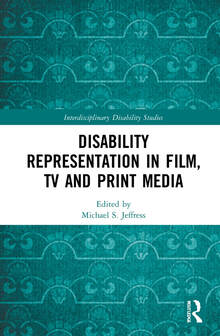 Image of Book Cover
Image of Book Cover
Disability Representation in Film, TV and Print Media (2022)
Featured title in Carnegie Mellon University Libraries' DEI Book Display.
Using sources from a wide variety of print and digital media, this book discusses the need for ample and healthy portrayals of disability and neurodiversity in the media, as the primary way that most people learn about conditions.
It contains thirteen newly written chapters drawing on representations of disability in popular culture from film, television and print media in both the global north and the global south, including the USA, Canada, India and Kenya. Although disability is often framed using a limited range of stereotypical tropes such as victims, supercrips or suffering patients, this book shows how disability and neurodiversity are making their way into more mainstream media productions and publications with movies, television shows and books featuring prominent and even lead characters with disabilities or neurodiversity.
Disability Representation in Film, TV, and Print Media will be of interest to all scholars and students of disability studies, cultural studies, film studies, gender studies and sociology more broadly.
Featured title in Carnegie Mellon University Libraries' DEI Book Display.
Using sources from a wide variety of print and digital media, this book discusses the need for ample and healthy portrayals of disability and neurodiversity in the media, as the primary way that most people learn about conditions.
It contains thirteen newly written chapters drawing on representations of disability in popular culture from film, television and print media in both the global north and the global south, including the USA, Canada, India and Kenya. Although disability is often framed using a limited range of stereotypical tropes such as victims, supercrips or suffering patients, this book shows how disability and neurodiversity are making their way into more mainstream media productions and publications with movies, television shows and books featuring prominent and even lead characters with disabilities or neurodiversity.
Disability Representation in Film, TV, and Print Media will be of interest to all scholars and students of disability studies, cultural studies, film studies, gender studies and sociology more broadly.
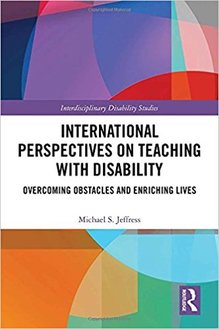 Image description: Book cover for International Perspectives on Teaching with Disability.
Image description: Book cover for International Perspectives on Teaching with Disability.
International Perspectives on Teaching with Disability: Overcoming Obstacles and Enriching Lives (2018)
Winner of the 2018 Book Chapter of the Year Award by National Communication Association's Ethnography Division.
"One of the strengths of this collection is the wide range of impairments that are included....Many of the people in this edited collection discuss their need to 'come out' in front of students or supervisors, disclosing their invisible impairments and (often unexpected) needs for accommodation. Others (such as those who use a wheelchair) have quite different discussions with their students, peers, and bosses. It is important for future generations of scholars to have access to these stories...so capturing the wisdom and experience of these authors makes this book invaluable reading." -Dr. Mark Sherry, University of Toledo
Efforts to reduce discrimination and increase diversity on campuses, coupled with shrinking budgets causing administrators to devote more resources toward recruiting and retaining students with disabilities, are fueling an
explosion of research in the area of inclusive education. An important focus that has been largely neglected is the place of teachers with disabilities in academe. International Perspectives on Teaching with Disability brings together 25 multidisciplinary scholars with disabilities from Zimbabwe, Canada, the Caribbean, the United Kingdom, Israel, and the United States to share their struggles and successes in teaching with disability.
About: The 18 chapters are written largely from autoethnographic perspectives grounded in solid academic research but full of anecdotes and self-reflexive narratives that provide insights into the lived experiences of the authors. Woven into the narratives are discussions of the complexities of self-disclosure and self-advocacy; the varied—and often problematic—ways disability is experienced, perceived, and discussed in society and in the classroom; the challenges of navigating academe with disability; the value of disability pedagogy; and the positive student outcomes achieved by teaching through disability, as well as practical applications and lessons learned that will benefit educators, administrators, and students preparing to become teachers.
This book is written to champion the integral place and role of disabled educators in academe. Current educators with disability will be affirmed. Those with disability aspiring to become teachers will be encouraged. Temporarily able-bodied administrators and educators will be challenged. Everyone will be informed. This book will be a welcome addition to reading lists in a wide array of academic fields including: Education, Pedagogy, Disability
Studies, Human Resources Management, and Sociology. Click HERE to read the foreword, preface and first chapter.
Winner of the 2018 Book Chapter of the Year Award by National Communication Association's Ethnography Division.
"One of the strengths of this collection is the wide range of impairments that are included....Many of the people in this edited collection discuss their need to 'come out' in front of students or supervisors, disclosing their invisible impairments and (often unexpected) needs for accommodation. Others (such as those who use a wheelchair) have quite different discussions with their students, peers, and bosses. It is important for future generations of scholars to have access to these stories...so capturing the wisdom and experience of these authors makes this book invaluable reading." -Dr. Mark Sherry, University of Toledo
Efforts to reduce discrimination and increase diversity on campuses, coupled with shrinking budgets causing administrators to devote more resources toward recruiting and retaining students with disabilities, are fueling an
explosion of research in the area of inclusive education. An important focus that has been largely neglected is the place of teachers with disabilities in academe. International Perspectives on Teaching with Disability brings together 25 multidisciplinary scholars with disabilities from Zimbabwe, Canada, the Caribbean, the United Kingdom, Israel, and the United States to share their struggles and successes in teaching with disability.
About: The 18 chapters are written largely from autoethnographic perspectives grounded in solid academic research but full of anecdotes and self-reflexive narratives that provide insights into the lived experiences of the authors. Woven into the narratives are discussions of the complexities of self-disclosure and self-advocacy; the varied—and often problematic—ways disability is experienced, perceived, and discussed in society and in the classroom; the challenges of navigating academe with disability; the value of disability pedagogy; and the positive student outcomes achieved by teaching through disability, as well as practical applications and lessons learned that will benefit educators, administrators, and students preparing to become teachers.
This book is written to champion the integral place and role of disabled educators in academe. Current educators with disability will be affirmed. Those with disability aspiring to become teachers will be encouraged. Temporarily able-bodied administrators and educators will be challenged. Everyone will be informed. This book will be a welcome addition to reading lists in a wide array of academic fields including: Education, Pedagogy, Disability
Studies, Human Resources Management, and Sociology. Click HERE to read the foreword, preface and first chapter.
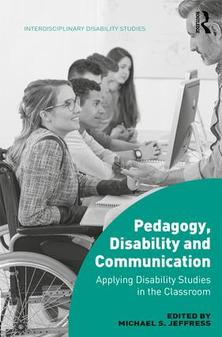 Image description: Book cover for Pedgagogy, Disability and Communication
Image description: Book cover for Pedgagogy, Disability and Communication
Pedagogy, Disability and Communication: Applying Disability Studies in the Classroom (2017)
“Disability is everywhere in the social world; assumptions about bodies and ways of moving through the world are fundamental to human interaction. Pedagogy, Disability and Communication provides tools for use in a variety of classrooms to help students communicate more ethically and effectively while generating insights that can enhance access and opportunity for all.” –Dr. Jim Ferris, Ability Center Endowed Chair in Disability Studies, University of Toledo
"The value of this collection lies in the underlying foundation and principle of a nothing about us without us approach by the editor, Michael S. Jeffress in collating contributions that effectively highlight scholars in the field who are leading the way in challenging the status quo of disability and curriculum design in higher education. These scholars illuminate the pathway for further reform in disability studies and for transforming the higher education environment. The pedagogical strategies suggested in the book may be adapted and also useful in many other courses in the higher education environment. Pedagogy, Disability and Communication is essential reading and a valuable resource for scholars, students, and researchers who value practical examples of pedagogy supported by theoretical underpinnings which challenge notions of disability through their curriculum and ultimately co-create new understandings and meanings of disability in higher education courses." -Dr Satine Winter, Griffith University, Mt Gravatt, Brisbane, Australia
"This significant contribution emphasises disability as a demographic to consider in the course analysis and reduce uncertainty and unlearn ableist biases and misconceptions with a view to create inclusive and affirming classroom environments in which students feel comfortable to have meaningful conversations about disability. The pedagogical principles, strategies and suggested assignments are transferable to diverse courses and disciplines, which reinforces the richness of this collection. In concluding this review, I highly recommend this book." -Armineh Soorenian, Disability & Society book review, 2018
"This is overall a volume that will establish easy credibility as a reference work; scholars at the intersection of Communication Studies and Disability Studies will extract from it unusual pieces and arguments too often overlooked by both fields." -Frederic Fovet, Disability & Society book review, 2019
"Ultimately, the collection argues for de-centering able-bodiedness in teaching practices through examinations of ethics, sexuality/gender, health, culture, and technology in connection with disability studies and the communication classroom....The collection offers a variety of intersectional and interdisciplinary approaches to teaching communication in the classroom, which makes it accessible to a wide-range of higher education instructors." -Alison Moore, Disability Studies Quarterly book review, 2020
"Pedagogy, Disability, and Communication: Applying Disability Studies in the Classroom is a much-needed interdisciplinary collection on how to actively incorporate disability studies in a variety of classroom contexts. From special topic courses to general accessibility and inclusive practices, the thirteen chapters all offer different, though interconnected, material....Though many of the contributors to this collection discuss how their own experience as disabled individuals translates to their work in the classroom, the collection is valuable to all educators—disabled and able-bodied alike. Furthermore, one of the (many!) great aspects of this collection is that it is useful for both educators who are well-versed in disability studies theory and those who are curious but don’t know where to start. I firmly believe that it is texts like these that should be required reading for all educators, as each of these chapters remind us: we need to move beyond the notion that everyone learns the same and work to actively create more inclusive learning environments (and ultimately, a more inclusive world!)." -Anelise Farris, Amazon.com Reviewer
About: Research has long substantiated the fact that living with a disability creates significant and complex challenges to identity negotiation, the practice of communication, and the development of interpersonal relationships. Furthermore, individuals without disabilities often lack the knowledge and tools to experience self-efficacy in communicating with their disabled peers. So how do these challenges translate to the incorporation of disability studies in a classroom context and the need to foster an inclusive environment for disabled students?
Bringing together a range of perspectives from communication and disability studies scholars, this collection provides a theoretical foundation along with practical solutions for the inclusion of disability studies within the everyday curriculum. It examines a variety of aspects of communication studies including interpersonal, intercultural, health, political and business communication as well as ethics, gender and public-speaking, offering case study examples and pedagogical strategies as to the best way to approach the subject of disability in education.
It will be of interest to students, researchers and educators in communication and disability studies as well as scholars of sociology and social policy, gender studies, public health and pedagogy. It will also appeal to anyone who has wondered how to bring about a greater degree of inclusion and ethics within the classroom. Click HERE for ordering information, a preview of the Table of Contents, and more info.
“Disability is everywhere in the social world; assumptions about bodies and ways of moving through the world are fundamental to human interaction. Pedagogy, Disability and Communication provides tools for use in a variety of classrooms to help students communicate more ethically and effectively while generating insights that can enhance access and opportunity for all.” –Dr. Jim Ferris, Ability Center Endowed Chair in Disability Studies, University of Toledo
"The value of this collection lies in the underlying foundation and principle of a nothing about us without us approach by the editor, Michael S. Jeffress in collating contributions that effectively highlight scholars in the field who are leading the way in challenging the status quo of disability and curriculum design in higher education. These scholars illuminate the pathway for further reform in disability studies and for transforming the higher education environment. The pedagogical strategies suggested in the book may be adapted and also useful in many other courses in the higher education environment. Pedagogy, Disability and Communication is essential reading and a valuable resource for scholars, students, and researchers who value practical examples of pedagogy supported by theoretical underpinnings which challenge notions of disability through their curriculum and ultimately co-create new understandings and meanings of disability in higher education courses." -Dr Satine Winter, Griffith University, Mt Gravatt, Brisbane, Australia
"This significant contribution emphasises disability as a demographic to consider in the course analysis and reduce uncertainty and unlearn ableist biases and misconceptions with a view to create inclusive and affirming classroom environments in which students feel comfortable to have meaningful conversations about disability. The pedagogical principles, strategies and suggested assignments are transferable to diverse courses and disciplines, which reinforces the richness of this collection. In concluding this review, I highly recommend this book." -Armineh Soorenian, Disability & Society book review, 2018
"This is overall a volume that will establish easy credibility as a reference work; scholars at the intersection of Communication Studies and Disability Studies will extract from it unusual pieces and arguments too often overlooked by both fields." -Frederic Fovet, Disability & Society book review, 2019
"Ultimately, the collection argues for de-centering able-bodiedness in teaching practices through examinations of ethics, sexuality/gender, health, culture, and technology in connection with disability studies and the communication classroom....The collection offers a variety of intersectional and interdisciplinary approaches to teaching communication in the classroom, which makes it accessible to a wide-range of higher education instructors." -Alison Moore, Disability Studies Quarterly book review, 2020
"Pedagogy, Disability, and Communication: Applying Disability Studies in the Classroom is a much-needed interdisciplinary collection on how to actively incorporate disability studies in a variety of classroom contexts. From special topic courses to general accessibility and inclusive practices, the thirteen chapters all offer different, though interconnected, material....Though many of the contributors to this collection discuss how their own experience as disabled individuals translates to their work in the classroom, the collection is valuable to all educators—disabled and able-bodied alike. Furthermore, one of the (many!) great aspects of this collection is that it is useful for both educators who are well-versed in disability studies theory and those who are curious but don’t know where to start. I firmly believe that it is texts like these that should be required reading for all educators, as each of these chapters remind us: we need to move beyond the notion that everyone learns the same and work to actively create more inclusive learning environments (and ultimately, a more inclusive world!)." -Anelise Farris, Amazon.com Reviewer
About: Research has long substantiated the fact that living with a disability creates significant and complex challenges to identity negotiation, the practice of communication, and the development of interpersonal relationships. Furthermore, individuals without disabilities often lack the knowledge and tools to experience self-efficacy in communicating with their disabled peers. So how do these challenges translate to the incorporation of disability studies in a classroom context and the need to foster an inclusive environment for disabled students?
Bringing together a range of perspectives from communication and disability studies scholars, this collection provides a theoretical foundation along with practical solutions for the inclusion of disability studies within the everyday curriculum. It examines a variety of aspects of communication studies including interpersonal, intercultural, health, political and business communication as well as ethics, gender and public-speaking, offering case study examples and pedagogical strategies as to the best way to approach the subject of disability in education.
It will be of interest to students, researchers and educators in communication and disability studies as well as scholars of sociology and social policy, gender studies, public health and pedagogy. It will also appeal to anyone who has wondered how to bring about a greater degree of inclusion and ethics within the classroom. Click HERE for ordering information, a preview of the Table of Contents, and more info.
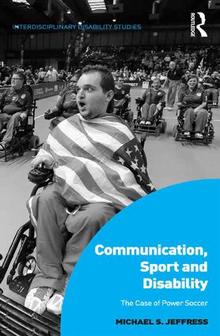 Image description: Book cover for Communication, Sport and Disability
Image description: Book cover for Communication, Sport and Disability
Communication, Sport and Disability: The Case of Power Soccer (2015)
"Jeffress' combination of sharing his personal story of his son and his ethnographic research on the benefits of power soccer is persuasive and thought-provoking....It is a better read than most of the research articles I have found on the topics included, because it is relatable and portrays the power soccer athletes as humans, not simply a set of data "-L. Savarese, American Journal of Recreation Therapy Vol. 17, Issue 4, 2018.
"Overall, this was an enjoyable read that provided incredible insight and vision into the athletes involved in the sport of power soccer" -S.G. Arthur-Banning, International Journal of Sport Communication, September 2016.
"The book is…certainly a worthwhile read for students and practitioners involved in adapted physical activity and sport, as well as other health-related professions. Any individual interested in adapted physical activity and/or sport would benefit from adding this text to his or her personal reference library.” –L.A. Malone & J.P. Barfield, Adapted Physical Activity Quarterly, July 2016.
"I recommend Communication, Sport and Disability for disability scholars as well as anyone interested in the development of disability sport in America. Jeffress has written a book that is very clear and readable which touches on a unique subject matter from a perspective - that of power wheelchair athletes - not often represented in the disability sport literature." - Shauna Cappe, Disability and Society, Vol 31, Issue 7, 2016
About: Sports are everywhere in American society, and given their prominence in the culture, it is easy to understand how most youth in the United States face pressure to participate in organized sports. But what does this mean for the hundreds of thousands of Americans who live with one or more physical disabilities and, in particular, those in powered wheelchairs?
Located at the intersection of sports and disability, this book tells the story of power soccer - the first competitive team sport specifically designed for motorized wheelchair users. Beginning in France in the 1970s, today, over sixty teams compete within the United States Power Soccer Association (USPSA) and the sport is actively played in over thirty countries.
Using ethnographic research conducted while attending practices, games, and social functions of teams from across the United States, Jeffress builds a strong case that motorized wheelchair users deserve more opportunity to play sports. They deserve it because they need the same physical and psychosocial benefits from participation as their peers, who have full use of their arms and legs. It challenges the social constructions and barriers that currently stand in the way. Most importantly, this book tells the story of some amazing power soccer athletes. It is a moving, first-hand account of what power soccer means to them and the implications this has for society.
"Jeffress' combination of sharing his personal story of his son and his ethnographic research on the benefits of power soccer is persuasive and thought-provoking....It is a better read than most of the research articles I have found on the topics included, because it is relatable and portrays the power soccer athletes as humans, not simply a set of data "-L. Savarese, American Journal of Recreation Therapy Vol. 17, Issue 4, 2018.
"Overall, this was an enjoyable read that provided incredible insight and vision into the athletes involved in the sport of power soccer" -S.G. Arthur-Banning, International Journal of Sport Communication, September 2016.
"The book is…certainly a worthwhile read for students and practitioners involved in adapted physical activity and sport, as well as other health-related professions. Any individual interested in adapted physical activity and/or sport would benefit from adding this text to his or her personal reference library.” –L.A. Malone & J.P. Barfield, Adapted Physical Activity Quarterly, July 2016.
"I recommend Communication, Sport and Disability for disability scholars as well as anyone interested in the development of disability sport in America. Jeffress has written a book that is very clear and readable which touches on a unique subject matter from a perspective - that of power wheelchair athletes - not often represented in the disability sport literature." - Shauna Cappe, Disability and Society, Vol 31, Issue 7, 2016
About: Sports are everywhere in American society, and given their prominence in the culture, it is easy to understand how most youth in the United States face pressure to participate in organized sports. But what does this mean for the hundreds of thousands of Americans who live with one or more physical disabilities and, in particular, those in powered wheelchairs?
Located at the intersection of sports and disability, this book tells the story of power soccer - the first competitive team sport specifically designed for motorized wheelchair users. Beginning in France in the 1970s, today, over sixty teams compete within the United States Power Soccer Association (USPSA) and the sport is actively played in over thirty countries.
Using ethnographic research conducted while attending practices, games, and social functions of teams from across the United States, Jeffress builds a strong case that motorized wheelchair users deserve more opportunity to play sports. They deserve it because they need the same physical and psychosocial benefits from participation as their peers, who have full use of their arms and legs. It challenges the social constructions and barriers that currently stand in the way. Most importantly, this book tells the story of some amazing power soccer athletes. It is a moving, first-hand account of what power soccer means to them and the implications this has for society.
